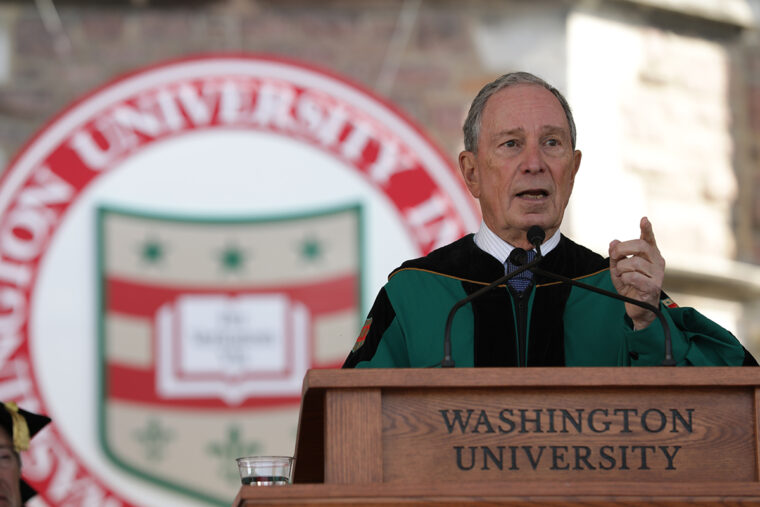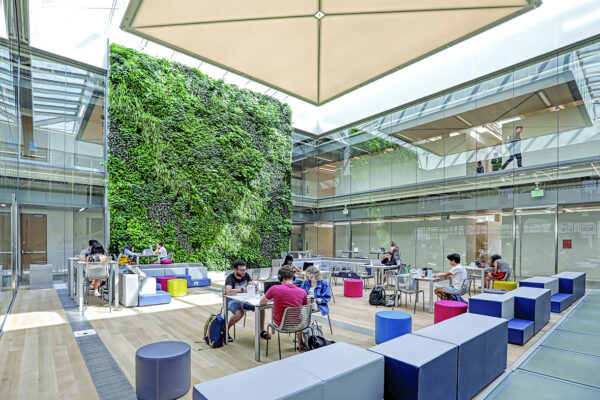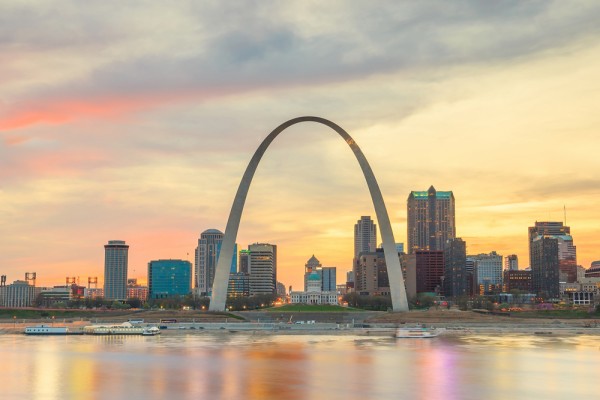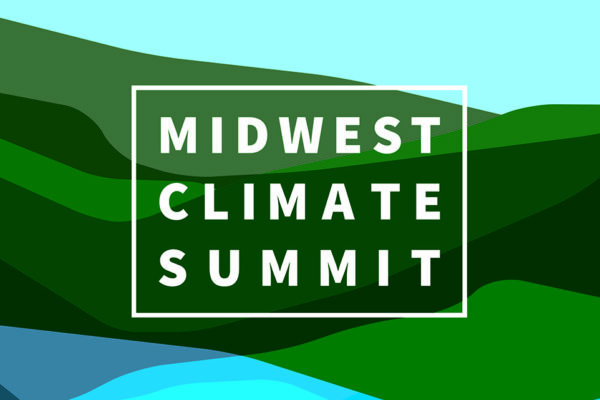Michael R. Bloomberg, the 108th mayor of New York City, addressed the crisis of our politics and our planet during his Commencement address to the Class of 2019 at Washington University in St. Louis.
“We face a lot of hard challenges in America today — from climate change to gun violence, to failing schools to the opioid epidemic, and on campuses, from the frightening trend toward racism, sexism, hatred, anti-Semitism and intolerance of unpopular views and opinions,” Bloomberg said at the university’s 158th Commencement on May 17 in Brookings Quadrangle.
“To have any hope of overcoming these challenges, we have to start by reclaiming our civic dialogue from those who are debasing and degrading it — and preventing us from getting things done.”
Bloomberg spoke before a crowd celebrating the 3,162 graduating undergraduate, graduate and professional students, including family, friends and faculty who supported them along their academic journey. He won big laughs for his insider jokes about WILD no-show artist T-Pain, John’s Donuts and the Ninja Turtle backpack guy.
“You’re probably asking yourself some big, important questions right now on this important day, like ‘How am I going to make a living? Will I ever have a mattress as nice as the one I had on the 40?” Bloomberg said. “And the biggest question of all: After Chancellor Wrighton retires, will he still wear double-breasted suits?”
But he also urged graduates to reject the sophistry of social media and blind partisanship and heed the words of university namesake George Washington, who said: “Truth will ultimately prevail where pains is taken to bring it to light.”
“Take pains to understand the other side. Take pains to expose lies. Take pains to reject scapegoating and xenophobia,” Bloomberg said. “Take pains not to fall for easy answers. And take pains to hold our leaders accountable for their words and their deeds. If you do that, I have no doubt that truth — and America — will prevail.”
Few issues are more vital — and more vulnerable to specious arguments — than climate change, Bloomberg said.
“Too many politicians aren’t interested in hard science. They’re only interested in political science and winning their next election. So they ignore the data, they try to cut funding for climate research — because they know it will undermine their political argument,” said Bloomberg, who also serves as the U.N. secretary-general’s special envoy for climate action and co-authored “Climate of Hope: How Cities, Businesses, and Citizens Can Save the Planet.”
“They’re either hiding their own ignorance or their own bad faith,” he said. “Either way, when government tries to gag scientists and censor our conclusions, watch out and speak up.”
On May 16, Bloomberg announced the Midwestern Collegiate Climate Summit, the largest expected convening of Midwest universities focused on mitigating the effects of climate change and moving to a 100% clean-energy economy. Washington University will host the summit in early 2020 and serve as the summit’s anchor institution.
Bloomberg said the climate summit will foster new partnerships among local and regional governments, private enterprise and institutions of higher education as well as support applied research though programs such as the university’s International Center for Energy, Environment and Sustainability, which works to discover alternative energy solutions and develop novel products, applications and sustainability practices.
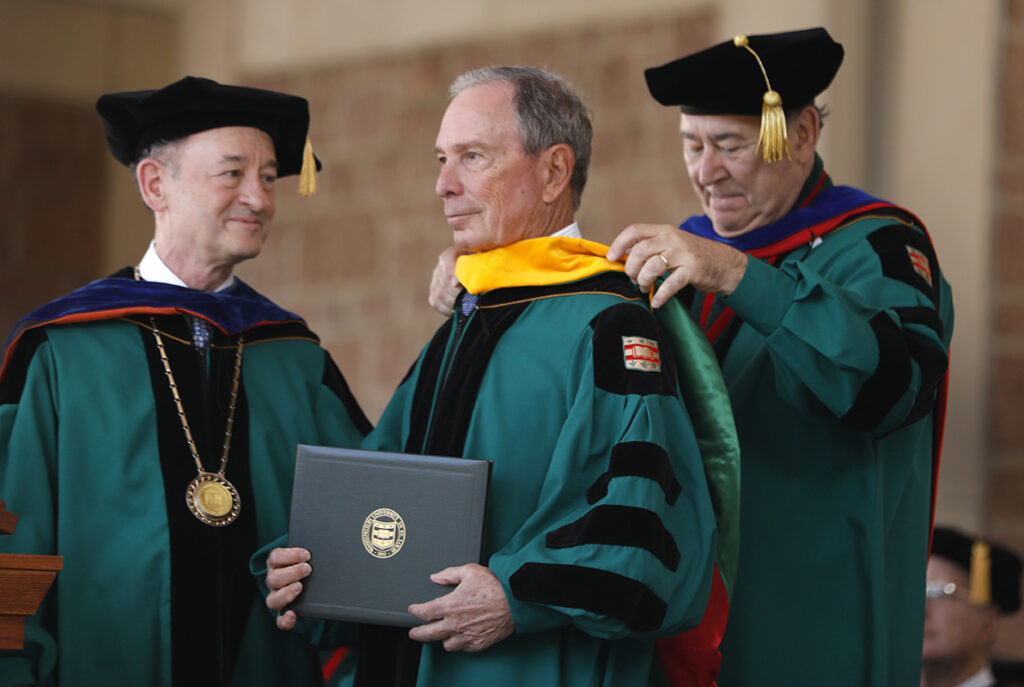
In his final address as chancellor, Mark S. Wrighton urged the Class of 2019 to join Washington University and Michael Bloomberg in the fight to preserve the climate.
“Climate change threatens the very existence of life as we know it. This is the most important problem of this century,” Wrighton said. “It is imperative that the world take steps to reduce the use of fossil energy and turn to other sources of energy.”
Wrighton also called for graduates to preserve the globe’s biodiversity, noting the dramatic decline in plant and animal life across the globe.
“In less than half a century, global populations of fish, birds, mammals, amphibians and reptiles have declined to less than half their size — all of this in the time since the graduation of the Class of 1969,” Wrighton said. “One in five of the plant species on Earth is currently threatened with extinction, putting supplies of food and medicines at risk. … If the statistics sound dire, that is because they are.”
Wrighton will end his 24-year tenure as chancellor May 31. During that time, Wrighton oversaw the construction of more than 50 new buildings, including the nearly completed east end project, the university’s largest capital investment ever on the Danforth Campus, and the growth of the endowment by $5 billion. But in his farewell letter in the Commencement program, Wrighton wrote that he sees more than buildings when walking across campus; he sees faces.
“I see the faces of so many young people who came to Washington University to learn and to contribute to new knowledge. … I see my faculty and academic colleagues who have committed the very best years of their lives to this institution of higher learning, who have moved us forward as a whole by their creativity and innovation, their great drive to discover something new and pass it on to a new generation of learners and leaders.
“I see those on our administrative team in a multitude of areas, who have worked tirelessly to build a university that is well-run, sustainable for the future, and able to respond to new opportunities and challenges.”
On June 1, Andrew Martin will assume the role of chancellor. Wrighton will join the faculty and he and his wife, Risa Zwerling Wrighton, will remain engaged in the university.
“There will always be places to which the world turns to learn more, discover new things and prepare young people for lives of meaning and purpose,” he wrote. “That is the legacy we have all been working on together.”
